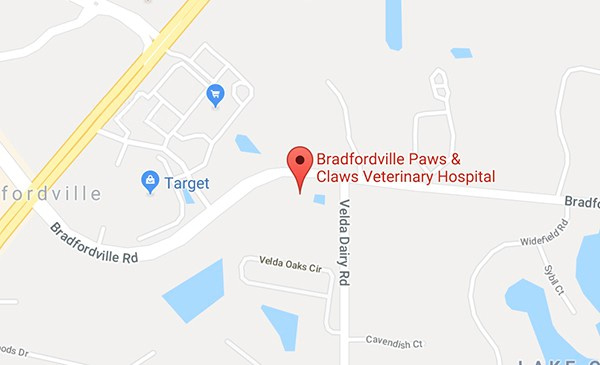Heartworm disease is one of the most serious—and preventable—health threats facing pets in Florida. Transmitted by mosquitoes, this potentially deadly parasite affects both dogs and cats, including those who spend most of their time indoors. Because our warm, humid climate allows mosquitoes to thrive year-round, heartworm prevention isn’t just a seasonal concern—it’s a must every month of the year.
Our small animal veterinarians want pet owners to understand how heartworm develops, why prevention is far safer than treatment, and the simple steps you can take to keep your dog or cat protected for life.
What Is Heartworm Disease?
Heartworm disease is caused by a parasitic worm called Dirofilaria immitis, which is spread through the bite of an infected mosquito. When a mosquito carrying heartworm larvae bites your pet, those tiny larvae enter the bloodstream. Over time – typically six months -they mature into adult worms that live in the heart, lungs, and surrounding blood vessels.
These worms can grow up to a foot long and multiply inside the body, leading to serious and potentially fatal damage to the heart and lungs. Because heartworms are transmitted by mosquitoes, pets in Florida are at risk year-round. Even a single mosquito bite can transmit the disease, which is why consistent prevention is so important.
While heartworm is most common in dogs, cats can also be infected, even if they live indoors. Unlike dogs, however, cats may host only a few worms, but those few can still cause severe or sudden health problems.

How Heartworm Affects Dogs
Dogs are natural hosts for heartworms, which means the worms can grow to full maturity, reproduce, and live for years inside a dog’s body. Once infected, a dog may have dozens, or even hundreds, of worms living in the heart, lungs, and surrounding blood vessels.
Over time, these worms cause severe damage to the heart and respiratory system, leading to what veterinarians call heartworm disease. In the early stages, dogs may not show any obvious signs, but as the infection progresses, you might notice:
-
A mild, persistent cough
-
Fatigue after moderate activity
-
Decreased appetite and weight loss
-
Difficulty breathing
-
In severe cases, heart failure or collapse
Heartworm disease in dogs is serious and potentially life-threatening. The good news is that it’s completely preventable with safe, affordable medications that protect your pet year-round.
How Heartworm Affects Cats
Although dogs are the primary hosts for heartworms, cats are also at risk, even if they live strictly indoors. Mosquitoes can easily find their way into homes, and it only takes one bite from an infected mosquito to expose a cat to heartworm larvae.
Cats are less suitable hosts, so they typically have fewer worms than dogs, but the disease can be even more dangerous. Because a cat’s heart and blood vessels are smaller, even a small number of worms can cause severe inflammation and lasting damage.
Signs of heartworm disease in cats can vary widely and may include:
-
Coughing or wheezing that resembles asthma
-
Vomiting
-
Loss of appetite or weight loss
-
Lethargy or sudden collapse
-
In some cases, sudden death may be the first sign of infection
There is no approved treatment for heartworm disease in cats, which makes prevention essential. The safest, most effective way to protect your cat is with consistent, year-round heartworm prevention prescribed by your veterinarian.
Prevention: The Key to Keeping Pets Safe
When it comes to heartworm, prevention truly is the best and only safe approach. Preventative medications work by eliminating immature heartworm larvae before they have a chance to grow into adult worms that can damage your pet’s heart and lungs.
There are several effective forms of heartworm prevention available:
-
Monthly oral medications (chewable tablets)
-
Topical treatments applied to the skin
-
Long-acting injections that provide months of continuous protection
Many of these options also protect against other parasites, such as fleas, ticks, and intestinal worms, making prevention even more valuable for your pet’s overall health.
At Paws and Claws Veterinary Hospital, we recommend year-round prevention for all dogs and cats, regardless of lifestyle. Even pets who stay mostly indoors are at risk in Florida’s mosquito-friendly climate. Missing just one or two doses can leave your pet unprotected, so consistency is key.
In addition to prevention, your pet should be tested for heartworms annually. This quick and simple blood test helps ensure that your pet remains heartworm-free and that their preventive medication is working as intended.
Why Treatment Is Not a Substitute for Prevention
While heartworm disease can sometimes be treated in dogs, the process is long, expensive, and not without risk. Treatment involves a series of injections designed to kill adult heartworms, along with strict rest and close veterinary monitoring to prevent complications as the worms die. Even with successful treatment, lasting damage to the heart and lungs may remain.
For cats, the situation is even more concerning—there is no approved treatment for adult heartworms. Veterinarians can only manage symptoms and try to reduce inflammation while the infection runs its course. Sadly, even a small number of worms can be fatal to a cat.
Because of these risks, prevention is the only truly safe and reliable way to protect your pet. Monthly preventatives are affordable, easy to give, and far less stressful than trying to treat an infection after it’s occurred.
What Pet Owners Should Do
The best way to protect your pet from heartworm disease is through consistent prevention and regular veterinary care. Here’s what we recommend:
-
Schedule an annual exam and heartworm test.
A simple blood test helps confirm your pet is heartworm-free before starting or renewing preventatives. -
Use heartworm prevention year-round.
Give preventatives on the same day each month or ask about long-acting injection options for convenience and reliability. -
Keep a reminder system.
Set phone alerts or sign up for reminders from your veterinary team to avoid missing doses. -
Talk to your veterinarian.
Our team at Paws and Claws Veterinary Hospital in Tallahassee can help you choose the best prevention for your dog or cat’s age, lifestyle, and health status.
Protecting your pet from heartworm disease is one of the simplest ways to ensure they live a long, healthy, and happy life. If your pet is due for testing or prevention, we’re here to help. Call now to schedule an appointment!

